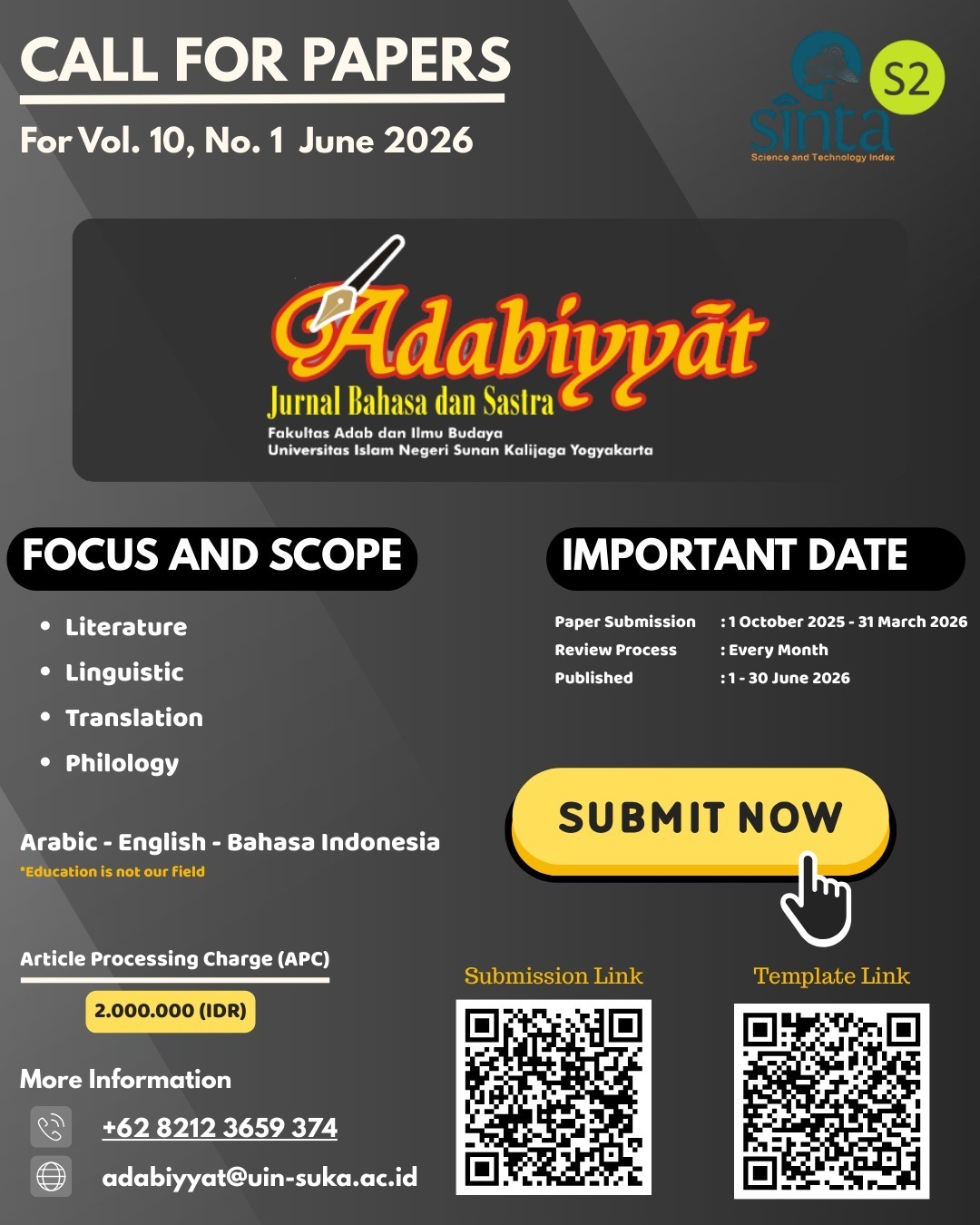LINGUISTIK MODERN (Model Pengkajian Kebudayaan)
DOI:
https://doi.org/10.14421/ajbs.2009.08108Abstract
Since the rise of the social science, in this case cultural studies, it has been difficult to determine the appropriate approach to analyze the social problems. The approach has close relation with the epistemology critic, which is unavoidable to the cultural studies, especially in the time where it handles the cultural variation facts. That the culture varies and that it gives the cultural studies a stimulus to adapt the modern linguistics are just a couple of facts. As a linguistics model, a cultural study has a powerful scientific base in the multi-variation of cultural data. The implication is so deep that it gives an orientation or a new perspective over a culture to be knowledgeable of human life. The use of modern linguistics approach (structural) in the cultural studies is related to Levi-Strauss ideas. He was the pioneer in the use of modern linguistics principles as models in order to know the cultural variations. The ambition of Levi-Strauss to build the cultural studies generates a scientific status for the study. It removes subjectivism, which ignores the essence of the meaning of culture. That ambition made structuralism a scientific study it is now although it is true that the modern linguistics creates the framework for the development of cultural studies. Yet, Structuralism has been criticized because it generates cultural studies to be mechanical.
Downloads
References
Ahimsa-Putra, Heddy Shri. 1986. “Etnosains dan Etnometodologi: Sebuah Perbandingan”. Dalam Masyarakat Indonesia, XII, 2, Agustus 1986. Jakarta: Lembaga Ilmu Pengetahuan Indonesia, hal. 103-131.
_______. 1997. “Claude Levi-Strauss: Butirbutir
Pemikiran Antropologi”. Dalam Octavio Paz, LeviStrauss: Empu Antropologi Struktural. Yogyakarta: LKiS.
Bedcock, CR. 1975. Levi-Strauss Structuralism and Sociological Theory. London: Hutchinson.
Bryant, Christopher G.A. 1985. Positivism in Social Theory and Research. New York: St. Martin’s Press.
Ember, Carol R. dan Melvin Ember. 1990. “Teori dan Metoda Antropologi Budaya”. Dalam T.O. Ihromi (ed.), Pokok-pokok Antropologi Budaya. Jakarta: Gramedia, hlm. 49-79.
Harris, Marvin. 1968. The Rise of Anthropological Theory. New York: Harper & Row Publishers.
Kuper, Adam. 1996. Pokok dan Tokoh Antropologi. Jakarta: Bhratara.
Levi-Strauss, Claude. 1963. Structural Antropology. London: Allen Lane The Penguin Press.
Malinowski, B. 1944. A Scientific Theory of Culture and Other Essays. New York: The University of North Carolina Press.
Piaget, Jean. 1995. Strukturalisme. Jakarta: Yayasan Obor Indonesia.
Radcliffe-Brown, A.R. 1952. Structure and Function in Primitive Society. London: Routledge & Kegan Paul.
Saussure, Ferdinand de. 1988. Pengantar Linguistik Umum. Yogyakarta: Gadjah Mada University Press.
Van Baal, J. 1987. Sejarah dan Pertumbuhan Teori Antropologi Budaya (1). Jakarta: Gramedia.
Downloads
Published
Issue
Section
License
- Adabiyyāt: Jurnal Bahasa dan Sastra publishes all articles entirely in full text.
- It is permissible for readers to download and to use it for scientific purposes and scientific dissemination.
- The author can re-publish the article that has been published by the Adabiyyāt: Jurnal Bahasa dan Sastra after obtaining written permission from the editor. This letter can be obtained by submitting a request letter for permission to republish the article to Adabiyyāt: Jurnal Bahasa dan Sastra via email adabiyyat@uin-suka.ac.id. In the second publication, the author is required to include information that the article was firstly published by the Adabiyyāt: Jurnal Bahasa dan Sastra.









